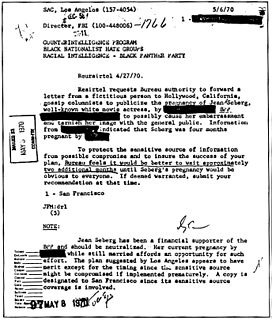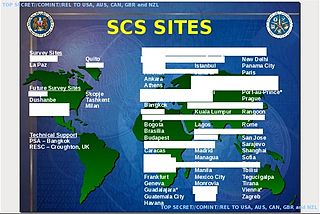Related Research Articles

COINTELPRO was a series of covert and illegal projects conducted by the United States Federal Bureau of Investigation (FBI) aimed at surveilling, infiltrating, discrediting, and disrupting domestic American political organizations. FBI records show COINTELPRO resources targeted groups and individuals the FBI deemed subversive, including feminist organizations, the Communist Party USA, anti–Vietnam War organizers, activists of the civil rights movement or Black Power movement, environmentalist and animal rights organizations, the American Indian Movement (AIM), independence movements, and a variety of organizations that were part of the broader New Left and unrelated groups such as the Ku Klux Klan.

The Federal Bureau of Investigation (FBI) is the domestic intelligence and security service of the United States and its principal federal law enforcement agency. Operating under the jurisdiction of the United States Department of Justice, the FBI is also a member of the U.S. Intelligence Community and reports to both the Attorney General and the Director of National Intelligence. A leading U.S. counter-terrorism, counterintelligence, and criminal investigative organization, the FBI has jurisdiction over violations of more than 200 categories of federal crimes.

Robert Philip Hanssen is a former Federal Bureau of Investigation (FBI) double agent who spied for Soviet and Russian intelligence services against the United States from 1979 to 2001. His espionage was described by the Department of Justice as "possibly the worst intelligence disaster in U.S. history." Hanssen is currently serving fifteen consecutive life sentences without parole at ADX Florence, a federal supermax prison near Florence, Colorado.

Aldrich Hazen "Rick" Ames is a former Central Intelligence Agency (CIA) officer turned KGB double agent, who was convicted of espionage in 1994. He is serving a life sentence, without the possibility of parole, in the Federal Correctional Institution in Terre Haute, Indiana, United States. Ames was formerly a 31-year CIA counterintelligence officer who committed espionage against the U.S. by spying for the Soviet Union and Russia. At the time of his arrest, Ames had compromised more highly classified CIA assets than any other officer in history until Robert Hanssen's arrest seven years later in 2001.

The United States Naval Criminal Investigative Service (NCIS) is the primary law enforcement agency of the U.S. Department of the Navy. Its primary function is to investigate criminal activities involving the U.S. Navy and U.S. Marine Corps, though its broad mandate includes national security, counterintelligence, counter-terrorism, cyber warfare, and the protection of U.S. naval assets worldwide. NCIS is the successor organization to the former Naval Investigative Service (NIS), which was established by the Office of Naval Intelligence after the Second World War.

The Bureau of Diplomatic Security, more commonly known as Diplomatic Security, or DS, is the security and law enforcement arm of the United States Department of State. DS is a world leader in international investigations, threat analysis, cyber security, counterterrorism, security technology, and protection of people, property, and information. DS's mission is to provide a safe and secure environment for officials to carry out U.S. foreign policy.
Black bag operations are covert or clandestine entries into structures to obtain information for human intelligence operations. This usually entails breaking and entering into denied areas.
Iyman Faris is a Pakistani citizen who served for months as a double agent for the FBI before pleading guilty in May 2003 of providing material support to Al Qaeda. A United States citizen since 1999, he had worked as a truck driver and lived in Columbus, Ohio. As of September 2003, Faris is the "only confessed al Qaeda sleeper caught on U.S. soil."In 2003 he was sentenced to 20 years in prison for providing material support to Al-Quaeda. In February 2020 an American federal court revoked Faris' US citizenship. In August 2020, he was released from a federal prison in Illinois.
The Lawrence Franklin espionage scandal involved Lawrence Franklin passing classified documents regarding United States policy towards Iran to Israel. Franklin, a former United States Department of Defense employee, pleaded guilty to several espionage-related charges and was sentenced in January 2006 to nearly 13 years of prison, which was later reduced to ten months' house arrest. Franklin passed information to American Israel Public Affairs Committee policy director Steven Rosen and AIPAC senior Iran analyst Keith Weissman, who later were fired by AIPAC. They were later indicted for illegally conspiring to gather and disclose classified national security information to Israel. However, prosecutors later dropped all charges against them without any plea bargain.

The Special Collection Service (SCS), codenamed F6, is a highly classified joint U.S. Central Intelligence Agency–National Security Agency program charged with inserting eavesdropping equipment in difficult-to-reach places, such as foreign embassies, communications centers, and foreign government installations. Established in the late 1970s and headquartered in Beltsville, Maryland, the SCS has been involved in operations ranging from the Cold War to the Global War on Terrorism.

Eric Michael O'Neill is an American former FBI counter-terrorism and counterintelligence operative. He worked as an Investigative Specialist with the Special Surveillance Group (SSG) and played a major role in the arrest, conviction, and imprisonment of FBI agent Robert Hanssen for spying on behalf of the Soviet Union and Russia. His book written about this experience, Gray Day: My Undercover Mission to Expose America's First Cyber Spy, was published in Spring 2019. He is a public speaker and security expert who currently lectures internationally about espionage and national security, cybersecurity, fraud, corporate diligence and defense, hacking, pursuing dreams and surviving Hollywood.
Felix Bloch is a former director of European and Canadian Affairs in the United States Department of State. He is known for his connection to the Robert Hanssen espionage case.

Spygate is a conspiracy theory initiated by President Donald Trump in May 2018 that the Obama administration had placed a spy in his 2016 presidential campaign for political purposes. Trump's first accusation was in a May 17, 2018, tweet in which he quoted Andrew C. McCarthy, who had just appeared on Fox & Friends repeating assertions from his May 12 article for National Review.

United States Army Counterintelligence (ACI) is the component of United States Army Military Intelligence which conducts counterintelligence activities to detect, identify, assess, counter, exploit and/or neutralize adversarial, foreign intelligence services, international terrorist organizations, and insider threats to the United States Army and U.S. Department of Defense (DoD).

The practice of mass surveillance in the United States dates back to wartime monitoring and censorship of international communications from, to, or which passed through the United States. After the First and Second World Wars, mass surveillance continued throughout the Cold War period, via programs such as the Black Chamber and Project SHAMROCK. The formation and growth of federal law-enforcement and intelligence agencies such as the FBI, CIA, and NSA institutionalized surveillance used to also silence political dissent, as evidenced by COINTELPRO projects which targeted various organizations and individuals. During the Civil Rights Movement era, many individuals put under surveillance orders were first labelled as integrationists, then deemed subversive, and sometimes suspected to be supportive of the communist model of the United States' rival at the time, the Soviet Union. Other targeted individuals and groups included Native American activists, African American and Chicano liberation movement activists, and anti-war protesters.

The origins of global surveillance can be traced back to the late 1940s, when the UKUSA Agreement was jointly enacted by the United Kingdom and the United States, whose close cooperation eventually culminated in the creation of the global surveillance network, code-named "ECHELON", in 1971.

U.S. president Barack Obama has received widespread criticism due to his support of government surveillance. President Obama had released many statements on mass surveillance as a result.
Christopher David Steele is a British former intelligence officer with the Secret Intelligence Service (MI6) from 1987 until his retirement in 2009. He ran the Russia desk at MI6 headquarters in London between 2006 and 2009. In 2009, he co-founded Orbis Business Intelligence, a London-based private intelligence firm.

Crossfire Hurricane was the code name for the counterintelligence investigation undertaken by the Federal Bureau of Investigation (FBI) from July 31, 2016, to May 17, 2017, into links between Russian officials and associates of Donald Trump and "whether individuals associated with [his] presidential campaign were coordinating, wittingly or unwittingly, with the Russian government's efforts to interfere in the 2016 U.S. presidential election". Trump was not personally under investigation until May 2017, when his firing of FBI director James Comey raised suspicions of obstruction of justice.
References
- 1 2 "Spying on the spy: Raw Story interviews former FBI investigator Eric O'Neill". The Raw Story. Retrieved 2017-02-01.
- ↑ "Surveillance Careers | FBIJOBS". Fbijobs.gov. Retrieved 2017-03-25.
- ↑ "Eric ONeill". Eric ONeill. Retrieved 2017-02-01.